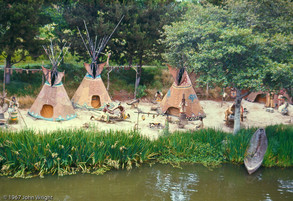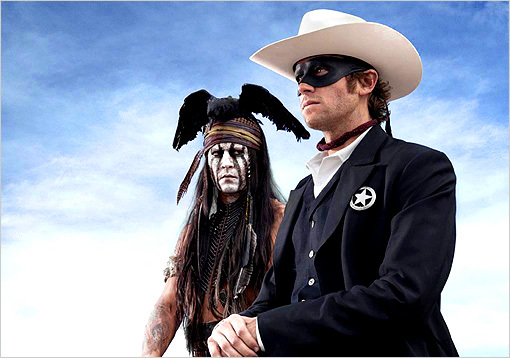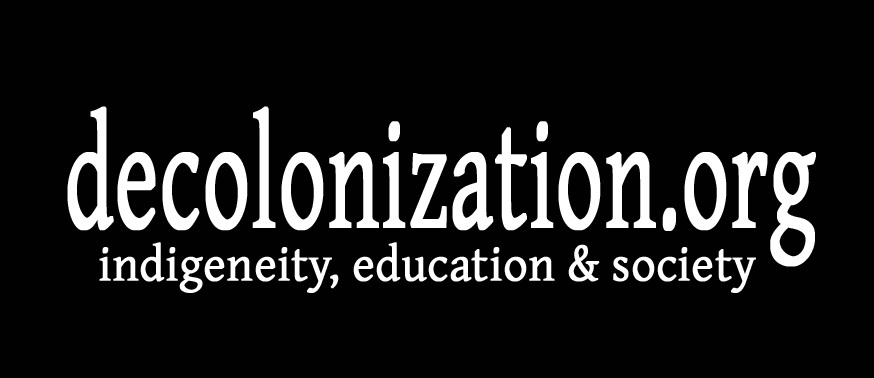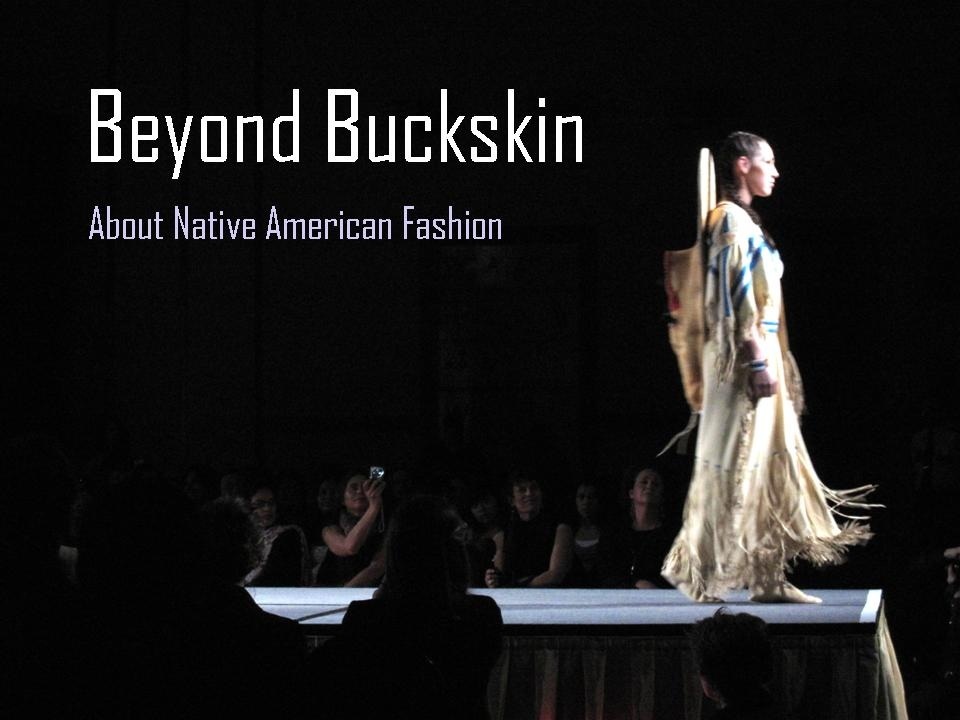|
Subtitle: What we gotta do to get you Natives to stop complaining? Sub-Sub Title: You could start by moving the whole "Natives in Movies" thing forward and actually tell some better stories. Truth be told I'm often too busy to read the news. So I end up getting most of my news from my constantly updating Facebook feed (apparently, I am not too busy to visit Facebook). This is how I came across the following story: Johnny Depp and Armie Hammer as Lone Ranger and Tonto -- FIRST LOOK! My immediate reaction was "no Johnny, just no." Johnny Depp and some other guy (and does it really matter who the other guy is? It's a Depp vehicle. Look at how that guy who played Barbosa or even the monkey often stole the Pirates of the Carribbean film from him, but we don't remember their names) are making a new Lone Ranger and Tonto movie with Depp starring as, you guessed, Tonto. (or maybe you didn't guess it. Maybe you thought he would play the "main character" of the Lone Ranger and a Native actor would be playing Tonto, well - Surprise!) But don't worry, Johnny is Native too. I say that with very little sarcasm. Maybe as Depp says he is a Native person of the "Cherokee or maybe Creek origin" or whatever. Maybe his great grandmother was an Indian princess who married his great grandfather after she was relocated due to a boarding school program that thought she would be better off living in the city so she could erase her culture through assimilation. Maybe the historical trauma experienced by his native great grandmother caused an irreparable fracture whereby she disappeared into the masses of our society and did not want to clarify for Johnny exactly what tribe she was from. Or maybe it's not my job to judge Depp's Native identity (it would, however, explain why he is so darn good looking). The real question is, Indian ancestry or not, could the remake of The Lone Ranger and Tonto ever really work as a good idea? (And I'm not just talking about an "entertaining" or even "bankable/ marketable" idea. I'm saying, could it ever work in a way that doesn't contribute to the continued exploitation of Native people at the hands of an outdated, outrageous stereotype?) The short answer - no. An even better answer - why try? There are so many other better movies that could be made or marketed. Recently I heard about a movie where Natives on the Rez were fighting zombies, and it's funny too. What about any number of books that have been written about Native peple that have yet to make their way to screen? Call me Johnny - we can talk. (I have this script we can look over... because who doesn't?) The long answer... no. No, no, no, no, no, no, no, no, no. You see, The Lone Ranger and Tonto started in 1933 when a hero of the expanding West (The Lone Ranger) and his trusty sidekick (his horse!) and then the other side-side kick guy (that would be Tonto) would set out via the radio each night to help solve some problem that needed solving. And of course push forward this whole manifest destiny thing and help "tame" the wild frontier to get it ready for western expansion. Yes, that's what it was really about. Chadwick Allen writes in "The Hero with Two Faces: The Lone Ranger as Treaty Discourse" that the Lone Ranger and Tonto was ultimately about the conquest of the Western frontier. (And I agree with him - so that makes it ALL OKAY!) And for Allen this meant that Tonto was "...the idealized Indian" who "operates as an 'island of Tribalism' in a frontier imagined as overwhelmingly white, supervised and supported by the 'governmental' authority of the idealized white ranger" (612). Yep, that's what it was really about. Tonto was a good Indian. He was an Indian that continuously helped the western expansion by solving problems on the Frontier that would eventually lead to the killing, displacement, and destruction of Native people. The radio show went international in 1934. And by 1955 it was broadcast by "249 US stations and had the highest rating of any radio western, reaching an estimated 12 million listeners each week" (Allen, 613). It then also became a television show, movies and all around merchandising powerhouse. So what of this movie? I haven't seen it. But I have pause and trepidation. First, Disney is the major studio attached to the making of this project. The writers for the movie are all non-Native people who are closely tied with the movies Pirates of the Carribean and Aladdin (known for it's sterotypical portrayal of "barbaric" Middle Eastern people and it's portrayal of a 16 year old girl who HAS to marry a Prince or otherwise be disowned by her father).  _Disney's involvement is particularly concerning being that Disney is a company that does not exactly have a good history with their treatment of Native peoples. The portrayal of the "Red Man" Indians in Peter Pan alone should inspire some trepidation. Of course, there is also the cartoon wonder that was Pochahontas. Native men in that movie were portrayed as boring, boorish and backward and poor Pochahontas herself was portrayed as America's princess all too eager to help the colonization project along. And let us not forget Disneyland - which at one time included an Indian village. The Indian Village sighting was originally a part of the "Jungle Cruise." And around the "Frontier Land" area you could stop by a store and buy all your cowboys and Indians gear, and then go to the fort to shoot at some Indians. (I haven't been to Disneyland in a while, but the last time I was there you could still buy yourself some good old Indian florescent pink and yellow feather war bonnets and a tomahawk, because with those bright feathers nobody will ever see you comin'! ) But even more, the studio and actors seem to know there will probably be an issue. They've already stuck Depp out there in front of the news media to address this issue. Almost as if having their "real Indian" get out to talk about how great this movie is actually going to be for Indians should somehow make everyone stop fidgeting uncomfortably around while they release pictures of Jack Sparrow with a bird on his head. Depp himself is paraded around to assure us that "I like the character. I think I have interesting plans for the character, and I think the film itself could be entertaining and very funny. But I also like the idea of having the opportunity to make fun of the idea of the Indian as a sidekick - which has always been [the case] throughout the history of Hollywood, the Native American has always been a second-class, third-class, fourth-class citizen, and I don't see Tonto that way at all. So it's an opportunity for me to salute Native Americans." And let me make special note that just because Johnny is Native and agrees to making the movie does not mean that this makes it a good idea. It doesn't mean there aren't any problems any more. This has happened to me a lot. "I see you wrote that this play is totally problematic in its portrayal of Native people, but guess what we met this one Native guy who said it was fine so that makes it ALL OKAY!" The "feeling" that there is something up with this whole "Tonto" thing, that's real (Disney and the people making this film). You should listen to that instinct. You should try to do something about it aside from trying to get us to back down because Johnny Native came out and said it was ALL OKAY. Find out about this history, Disney. Find out about what it means to be a "Tonto", watch Reel Injun, read books about the portrayal of Indian people in films, have a talk with some other Indians (because we know you have your one guy, but you can have more than one talking at you... it's alright). Diane Krumrey writes in her essay "Subverting the Tonto Stereotype in Popular Fiction, or, why Indians say 'UGH'" that "...the winning combination in a frontier novel had to include an Indian, male or female, who loved and supported the main character away from danger, who would even sacrifice him - or herself to preserve the whites. In America, this has come to be known as the Lone Ranger and Tonto Syndrome..." You see Johnny, it's a syndrome. It's a real thing. And it's still carried with Native peoples, especially those who have to go to the movies to watch as we become tall blue animal like creatures who have sex with our hair, or shirtless extra warm werewolves, or primitive monkey like people who try to protect our greatest secret, that aliens were made of crystals and gave us all of our knowledge. Tonto is a thing. Being called a Tonto is a thing. Maybe you can try to re appropriate Tonto, maybe it's a bit of an admirable goal, but did you see what they did with Pirates of the Caribbean III? If you couldn't control that monster - how in the hell are you going to control this? And in the end, we watch as once again a Native person is portrayed on screen aside a strong, valiant white character. We wait and wonder what happens next. We listen as people wonder "why was that such a big deal anyway. Tonto was (insert nice adjective here, funny, smart, strong, deeply in touch with the earth, better at shooting a bow and arrow)" and then we go home and think about how we don't really ever get to see portrayals of Native people on screen that don't somehow involve old stereotypes that refuse to die. And then my daughter goes to school. And I remember being in school and being the Indian girl there. Granted, I never took the time to ask these kids if their motivation for what they portrayed as "Cowboys and Indians" was mostly influenced by their own imagination or if it was as a result of what happens in the movies. But I have a feeling. Because you see, Johnny, what happens with these movies might not seem real to you, but it's real. When I was in elementary school I had long, dark hair that I wore in braids. Little kids would dance around me sometimes and whoop and holler. They would pull my braids and call me "Pochahontas" or sometimes "Wild Flower" or "Indian Girl." "Where's your bow and arrow Pochahontas? Why don't you growl around like a dog? How come you aren't dancing around and whooping like this?" (Boy starts dancing around like and Indian around the fire making whooping noises). And one time I watched as they played Cowboys and Indians, which for them meant grabbing some kid and pretending to tie him to a wooden pole where they set him on fire while dancing around him (those were the Indians). In rode the most powerful cowboy. He had the power to put out fire and rescue this kid. He also had the power to kill every single Indian in sight. At the end of it all as he was riding away he stopped in front of me and spit at the ground. "Don't mess with us you Indians" he said. End scene. Look Johnny if you want to contact me click on the contact button above. I'm happy to talk. My mom has the biggest crush on you by the way. It's part of the reason why I can't say that I do, because that would be weird to have a crush on your future stepfather.
1 Comment
|
SubscribeClick to
AuthorCutcha Risling Baldy is an Associate Professor and Department Chair of Native American Studies at Humboldt State University. She received her PhD in Native American Studies from the University of California, Davis. She is also a writer, mother, volunteer Executive Director for the Native Women's Collective and is currently re-watching My Name is Earl... (5) Top PostsOn telling Native people to just "get over it" or why I teach about the Walking Dead in my Native Studies classes... *Spoiler Alert!*
Hokay -- In which I lead a presentation on what happens when you Google "Native American Women" and critically analyze the images or "Hupas be like dang where'd you get that dentalium cape girl? Showing off all your money! PS: Suck it Victorias Secret"
In which we establish that there was a genocide against Native Americans, yes there was, it was genocide, yes or this is why I teach Native Studies part 3 million
5 Reasons I Wear "Indian" Jewelry or Hupas...we been bling-blingin' since Year 1
Pope Francis decides to make Father Junipero Serra a saint or In Which I Tell Pope Francis he needs to take a Native Studies class like stat
I need to read more Native blogs!A few that I read...
Archives
June 2020
Categories
All
|







 RSS Feed
RSS Feed
